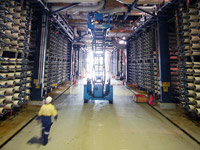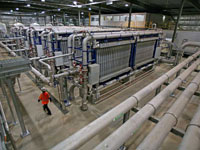Background
In 2006, south east Queensland was experiencing its worst water shortage in over 100 years with over 60 per cent of the area in drought. With climate change impacts, well below average rainfall for the previous six years and significant population growth, the Queensland Government needed a reliable, long term water supply.
The Western Corridor project was one of the components of the South East Queensland Regional Water Strategy which also included new pipelines, a new dam, dam upgrades and the South East Queensland Desalination Plant.
Description
The project involved building a network of more than 200 kilometres of pipeline to take treated water from six existing wastewater treatment plants (located throughout Brisbane and Ipswich) to three new advanced water treatment plants:
- Bundamba, 66 megalitres per day
- Gibson Island, 100 megalitres per day
- Luggage Point, 66 megalitres per day
These new plants create purified recycled water to a quality that can be reused by industry (such as the nearby Tarong and Swanbank Power Stations) and also returned to Wivenhoe Dam, the main drinking reservoir for south east Queensland.
There are seven stages of water treatment to ensure safe drinking water is supplied through the Western Corridor Recycled Water Project. The seven stages are:
- Source control: Preventing harmful chemicals from entering the wastewater system.
- Treatment at the Wastewater Treatment Plant: A biological reactor destroys and removes most solids, organic matter, nutrients, chemicals and some micro-organisms. At this stage, this water can be used for outdoor irrigation. The water quality is also monitored and will not take water for treatment in the next stage unless it meets quality requirements.
- Microfiltration: The first barrier within the Advanced Water Treatment Plant. This process involves low-pressure membrane filtration to remove small suspended particles, bacteria and other materials from the water.
- Reverse osmosis: The second barrier within the Advanced Water Treatment Plant. This high- pressure membrane filtration process forces the water through sheets of thin plastic membranes to filter out minerals and impurities such as salts, viruses, pesticides and other material.
- Disinfection and advanced oxidation: The third barrier within the Advanced Water Treatment Plant. The water is exposed to ultraviolet light combined with hydrogen peroxide to eliminate any remaining organic compounds. The water is now ultra-pure meaning it contains very low levels of salt and insignificant amounts of any organic chemicals and no micro organisms. Water is also chlorinated after UV disinfection to ensure no secondary contamination (from pipelines and storage tanks) can occur. At this stage, the recycled water is supplied for industrial use such as the Swanbank and Tarong Power Stations. If the Wivenhoe Dam level drops below 40 per cent, then the recycled water will be treated with two further stages (as below).
- Natural environment: The now purified water is blended with natural water in a dam and exposed to natural sunlight and other natural processes.
- Treatment at the Water Treatment Plant: All water from the dam including the recycled water is treated at a Water Treatment Plant. Treatment at the plant involves a combination of filtration and disinfection processes.
The Western Corridor Recycled Water Project is the largest advanced recycled water project in the southern hemisphere and third largest in the world with the capability to provide a total of 232 megalitres per day of water.
Gallery


Click an image to view in a larger size